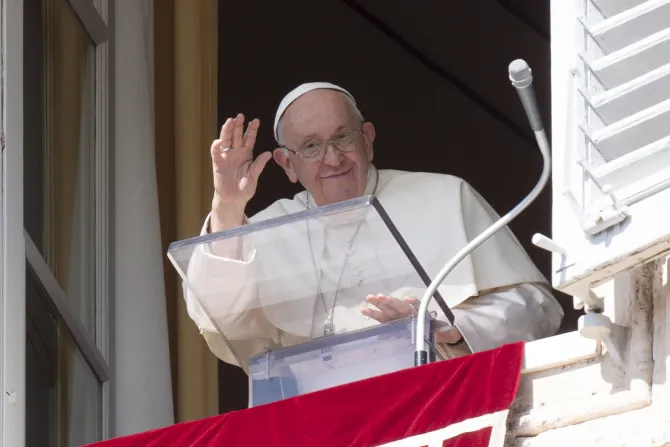Pope Francis waves from a window of the Apostolic Palace during his weekly Sunday address and Angelus on Oct. 8, 2023. He spoke about the importance of having gratitude for the gifts one has received, especially the gifts of life and faith from God. | Vatican Media.
Do not forget to be grateful to God for the free gift of your life and faith, Pope Francis said in his weekly message at the Vatican yesterday.
The pope’s address before praying the Angelus yesterday focused on the day’s Gospel passage and the parable Jesus told the chief priests and elders about the tenants who refused to give the landowner his due, to the point of beating and killing servants and even the landowner’s son when they were sent to collect the fruits of the harvest.
“With this parable, Jesus reminds us what happens when a person deceives himself into thinking that he does things on his own, and he forgets to be grateful. He forgets the real basis of life: that good comes from the grace of God, that good comes from his free gift,” Francis said to thousands of people from a window overlooking St. Peter’s Square.

Pope Francis explained Jesus’ message behind the dramatic parable and the reason for its “sad ending.”
“The landowner did everything well, with love,” he said. “He himself toiled to plant the vineyard; he surrounded it with a fence to protect it; dug a wine press, and built a watchtower. Then he entrusted his vineyard to some tenants, leasing his prized possession to them, thus treating them on an equal plane, so that his vineyard might be well cultivated and might bear fruit.”
Under these circumstances, there should have been a good outcome, with everyone fairly sharing the fruits of the harvest — but instead, “ungrateful and greedy thoughts insinuated themselves into the minds of the tenants,” he said.
Ungratefulness and greediness are always at the root of conflicts, he underlined, adding that the same process can also happen in our hearts.
“When someone forgets this gratitude to God, he ends up no longer facing his own situation and his own limits with the joy of feeling loved and saved, but with the sad illusion of needing neither love nor salvation,” the pope said.
He noted that when we no longer let ourselves be loved, we become prisoners to greed and the desire to have more than others or to be more important than others.
This process, he warned, can even lead to violence, driven by resentment fueled by “many dissatisfactions and recriminations, so many misunderstandings and so many feelings of envy.”
“Yes, dear brothers and sisters, ungratefulness generates violence, it takes peace away, and makes us feel and yell when we speak, without peace, while a simple ‘thank you’ can bring back peace,” Francis said.

The pope proposed several questions for self-reflection on the topic: “Am I aware that life and the faith are gifts I have received? Am I aware that I myself am a gift? Do I believe that everything comes from the grace of the Lord? Do I understand that, without merit, I am the beneficiary of these things, that I am loved and saved gratuitously? And above all, in response to grace, do I know how to say ‘thank you’?”
Recalling advice he has given to families in the past, Pope Francis again emphasized the importance of saying “thank you,” “please,” and “I’m sorry” in one’s relationships.
“May Mary, whose soul glorifies the Lord, help us make gratitude the light that dawns daily in our hearts,” he prayed before then leading the Angelus, a Marian prayer, in Latin.
After the prayer, the pope said he is following the news of conflict in Israel and Palestine “with apprehension and sorrow” and issued an appeal to “please stop weapons attacks!”
Source: CNA

